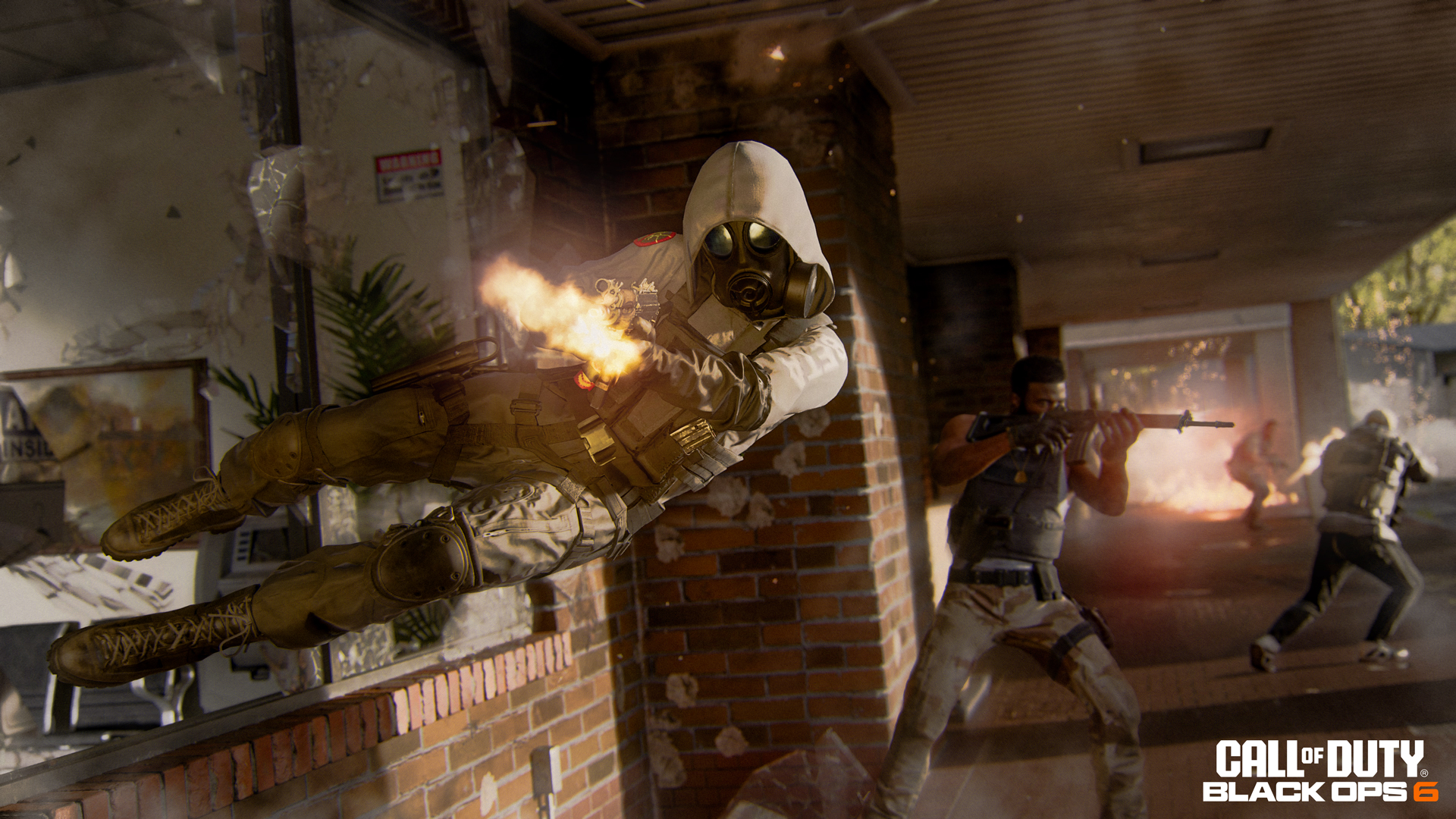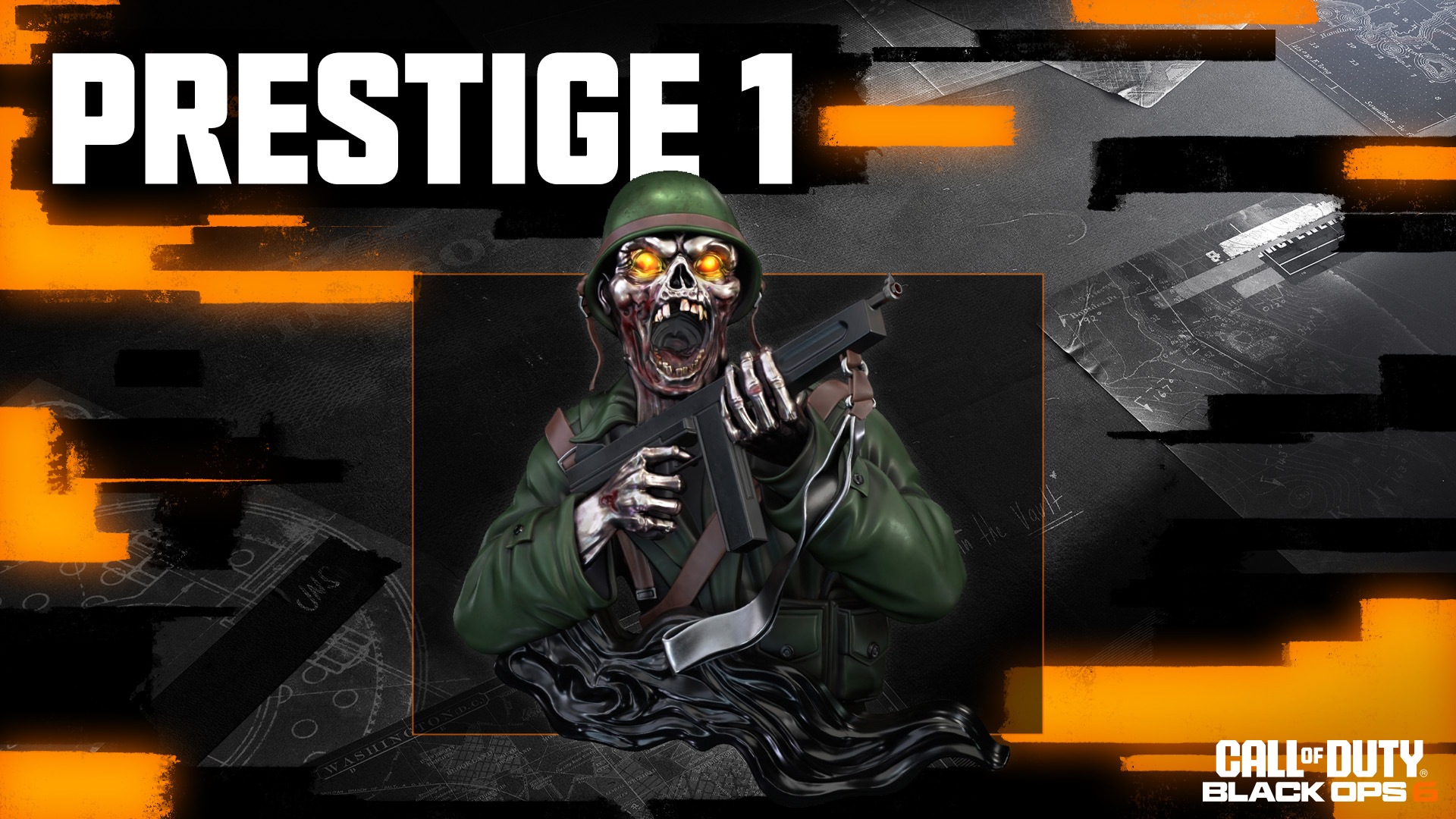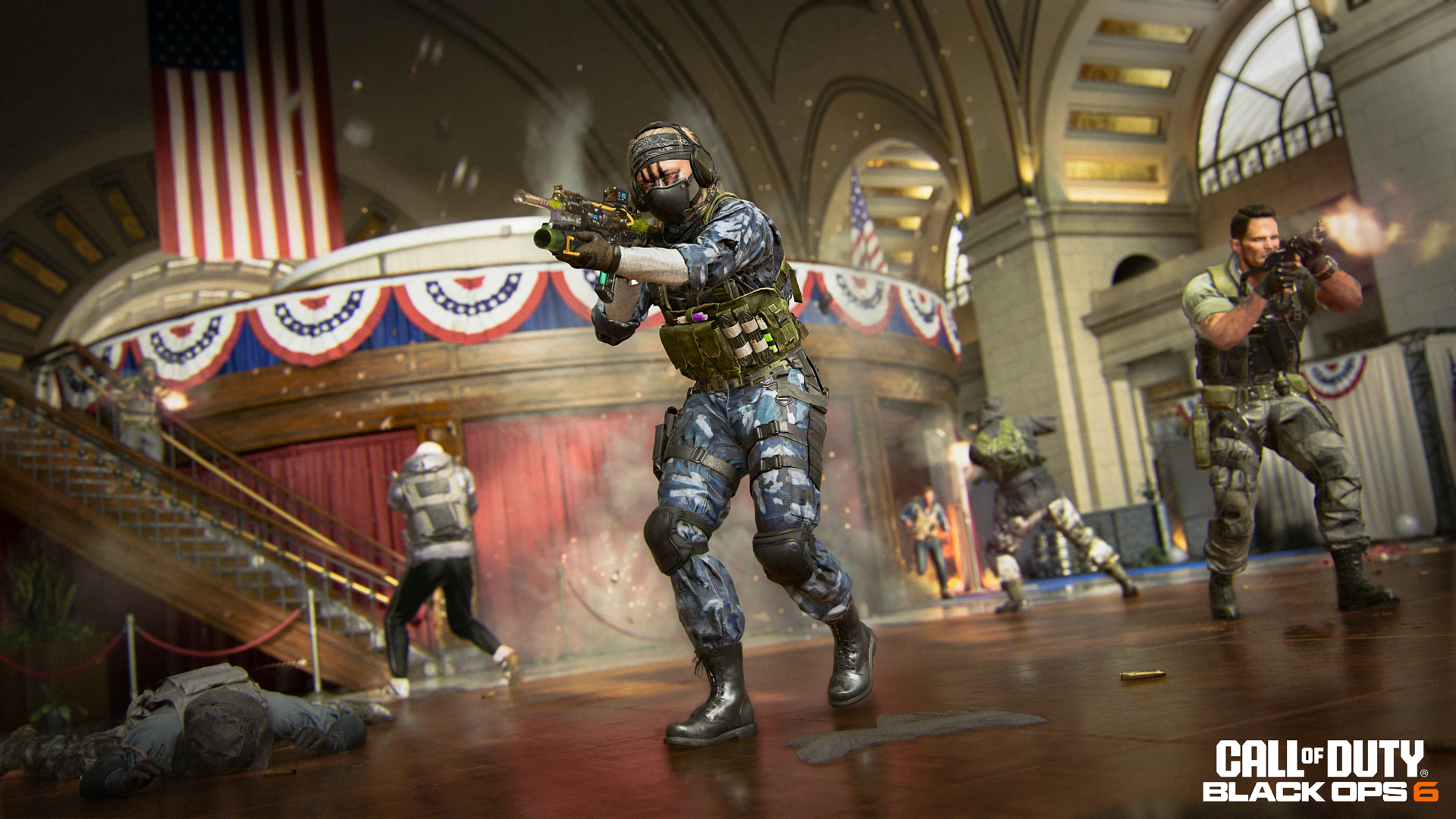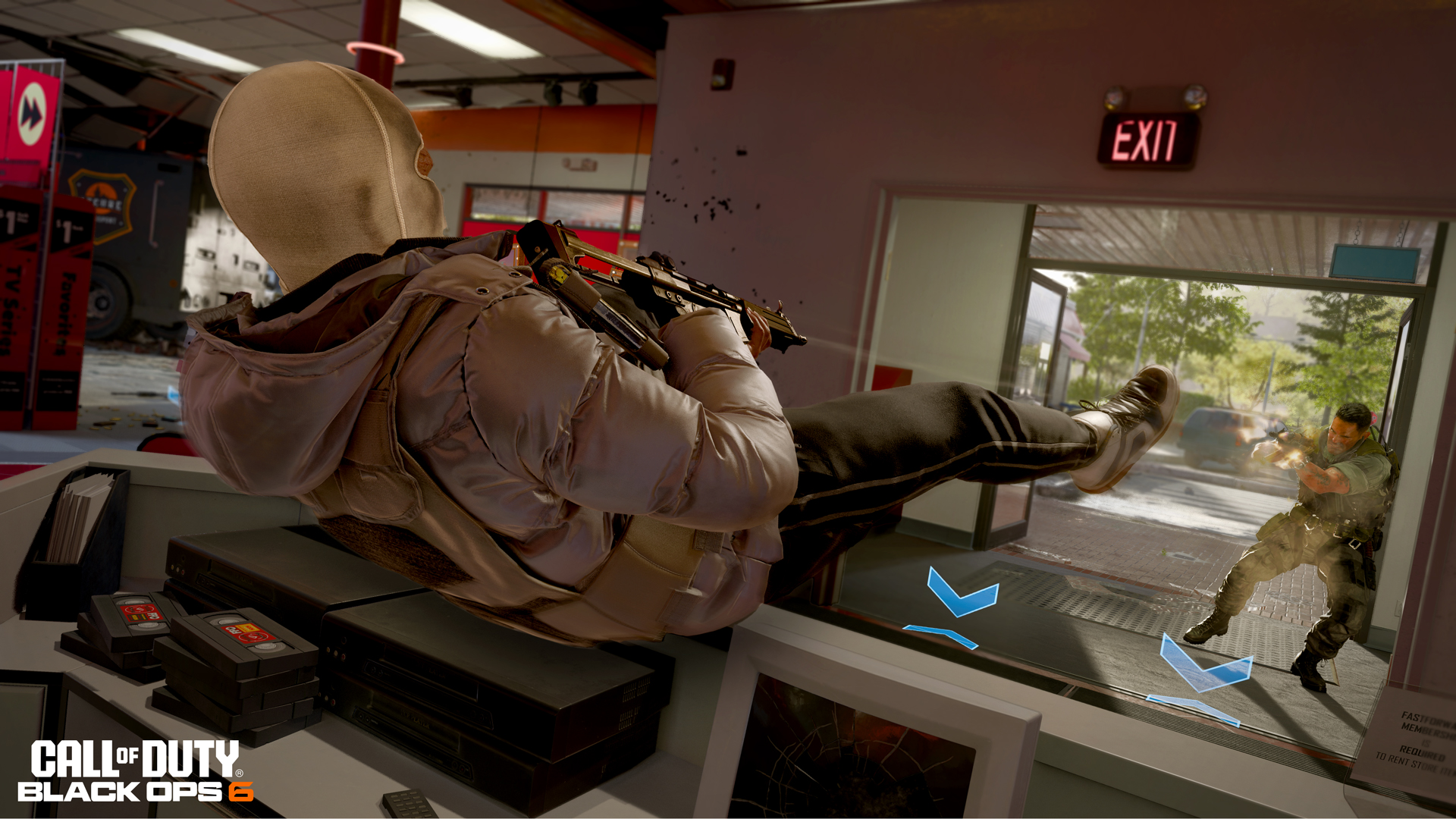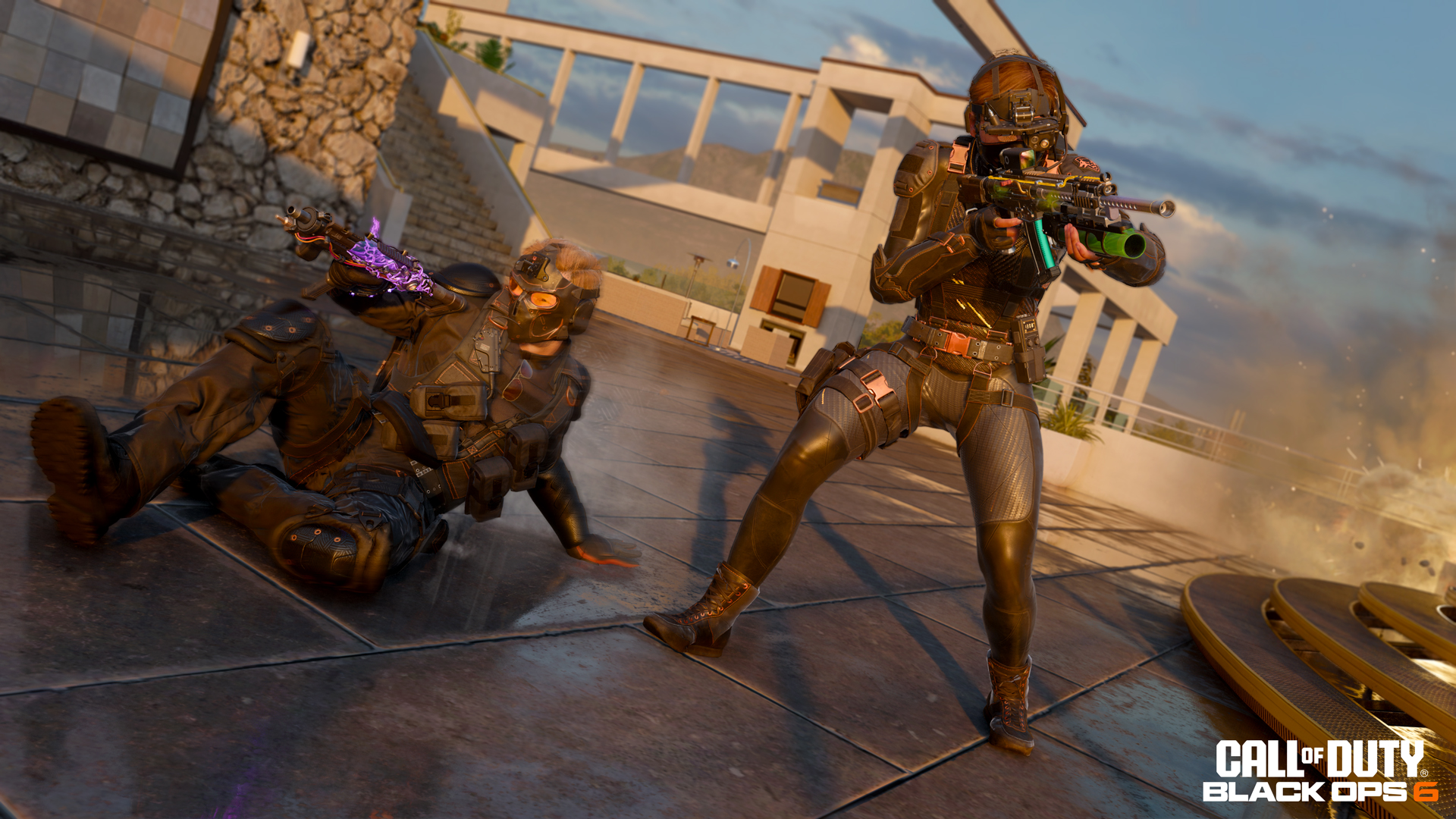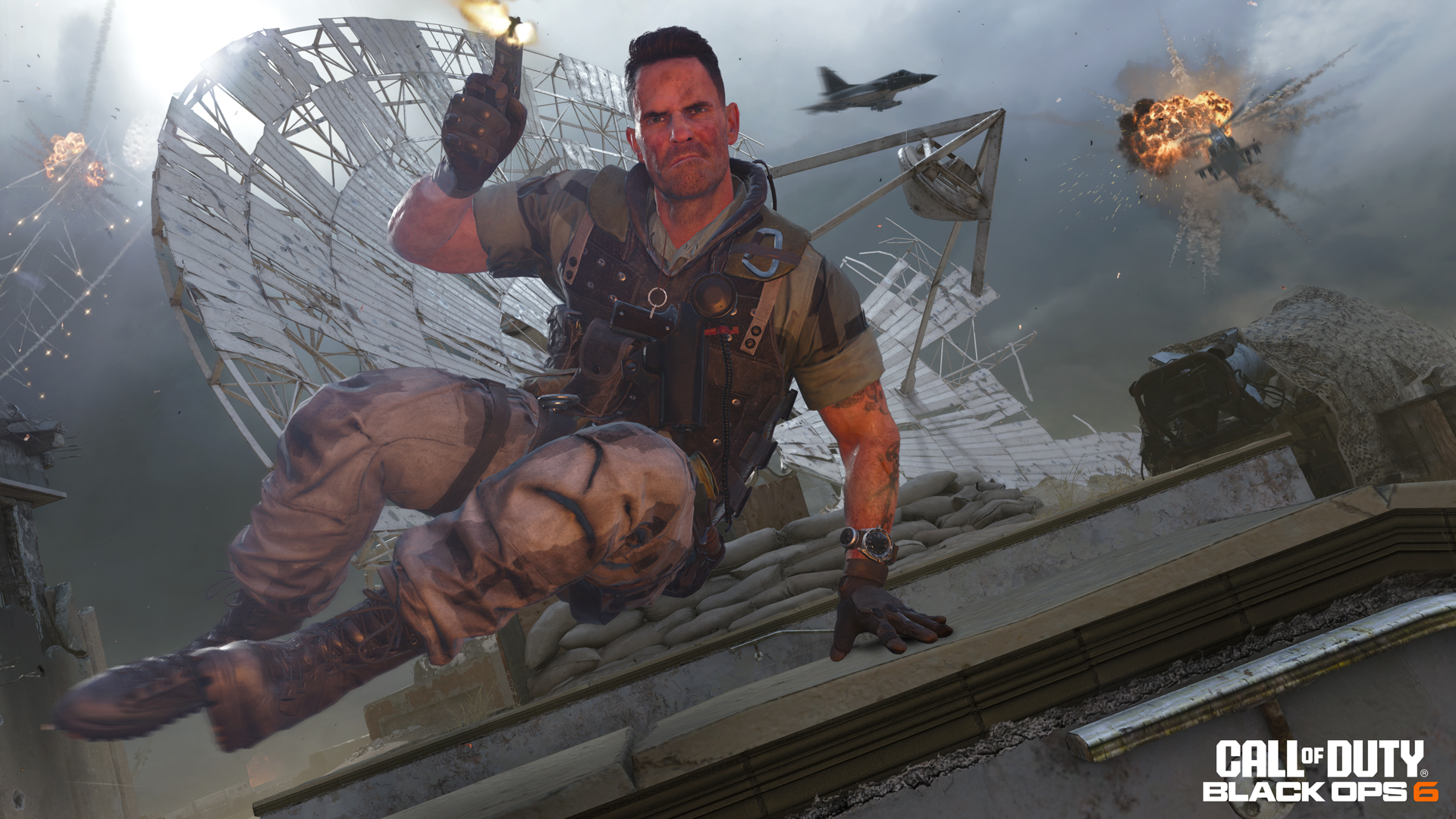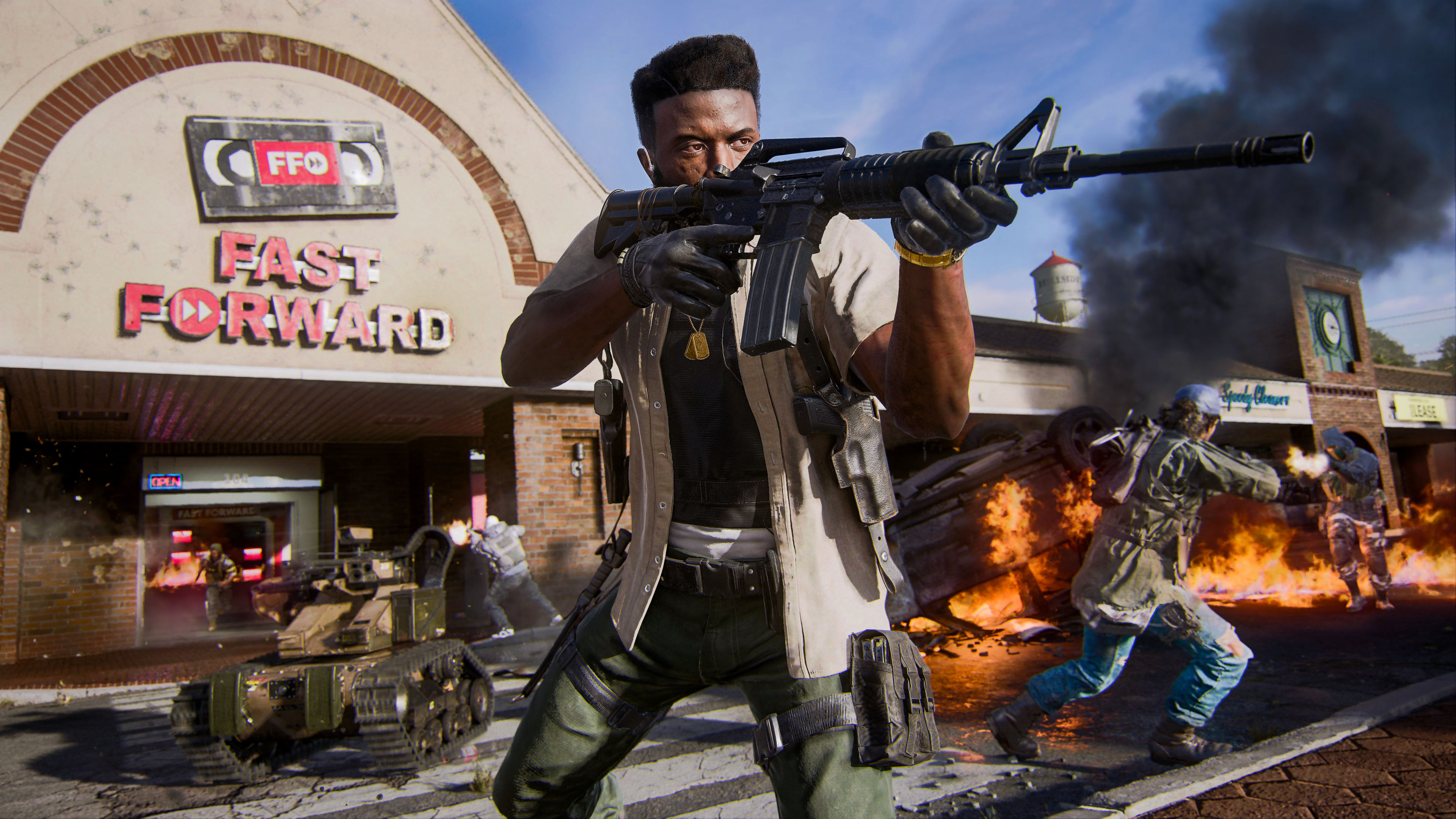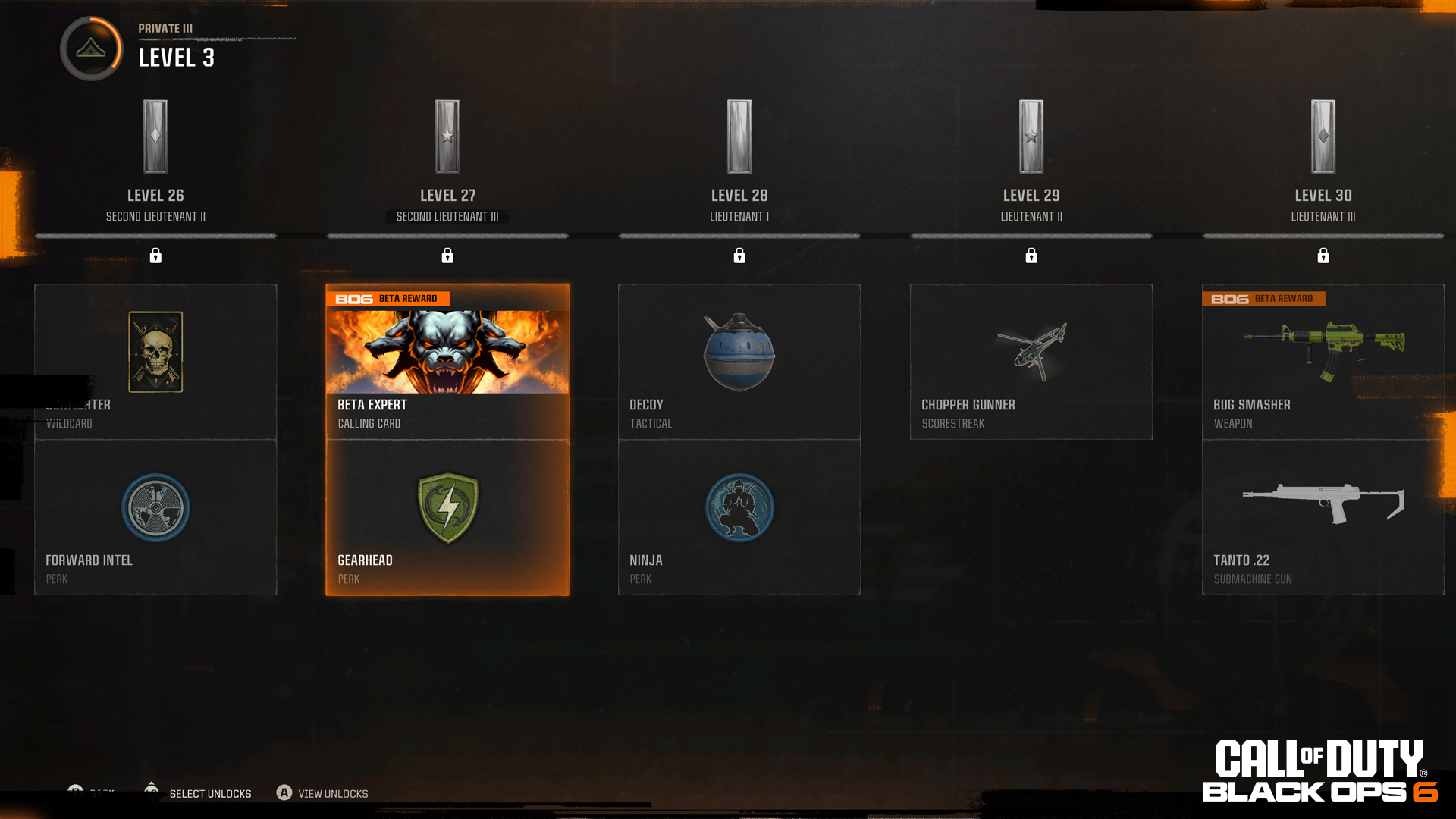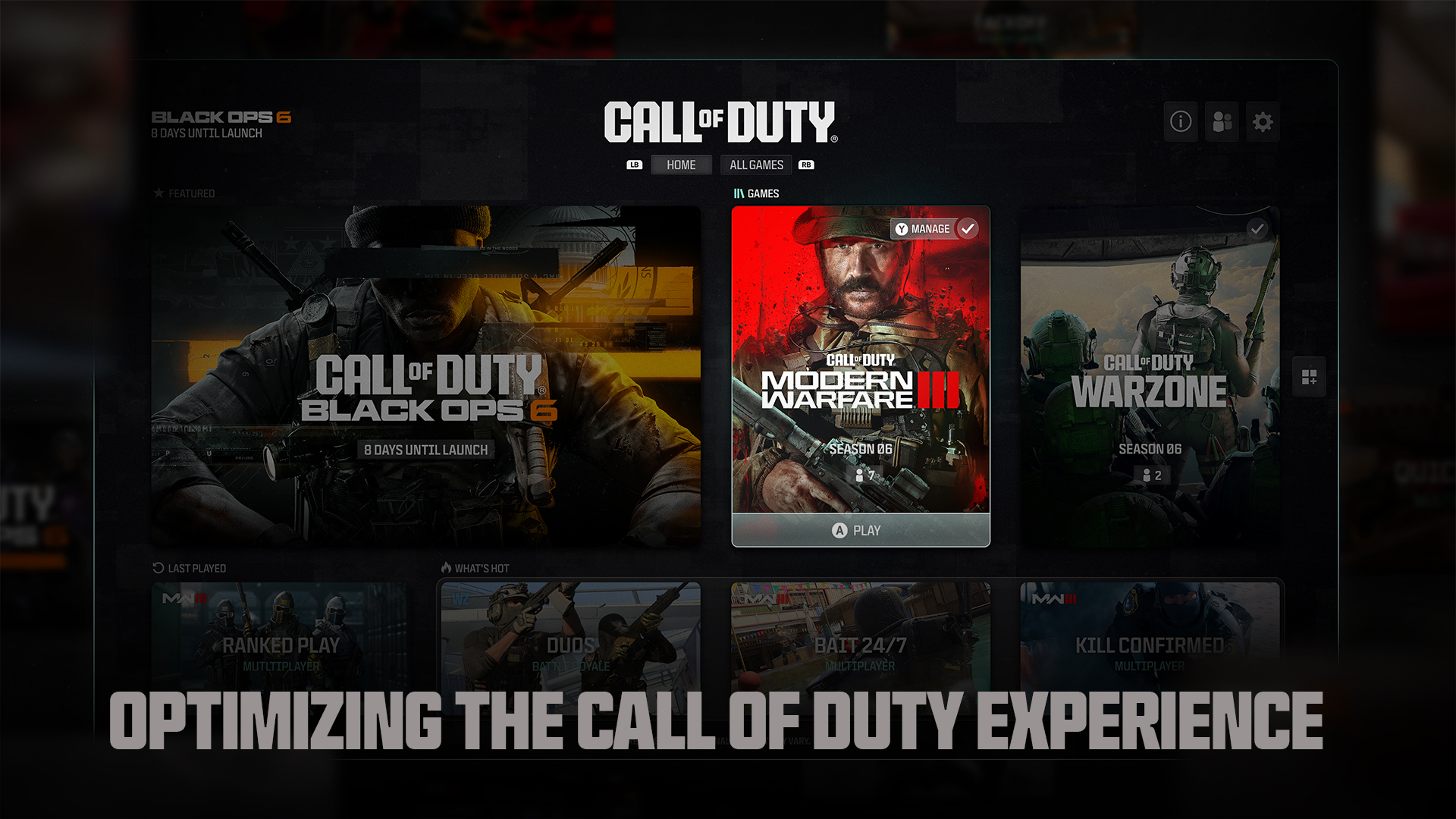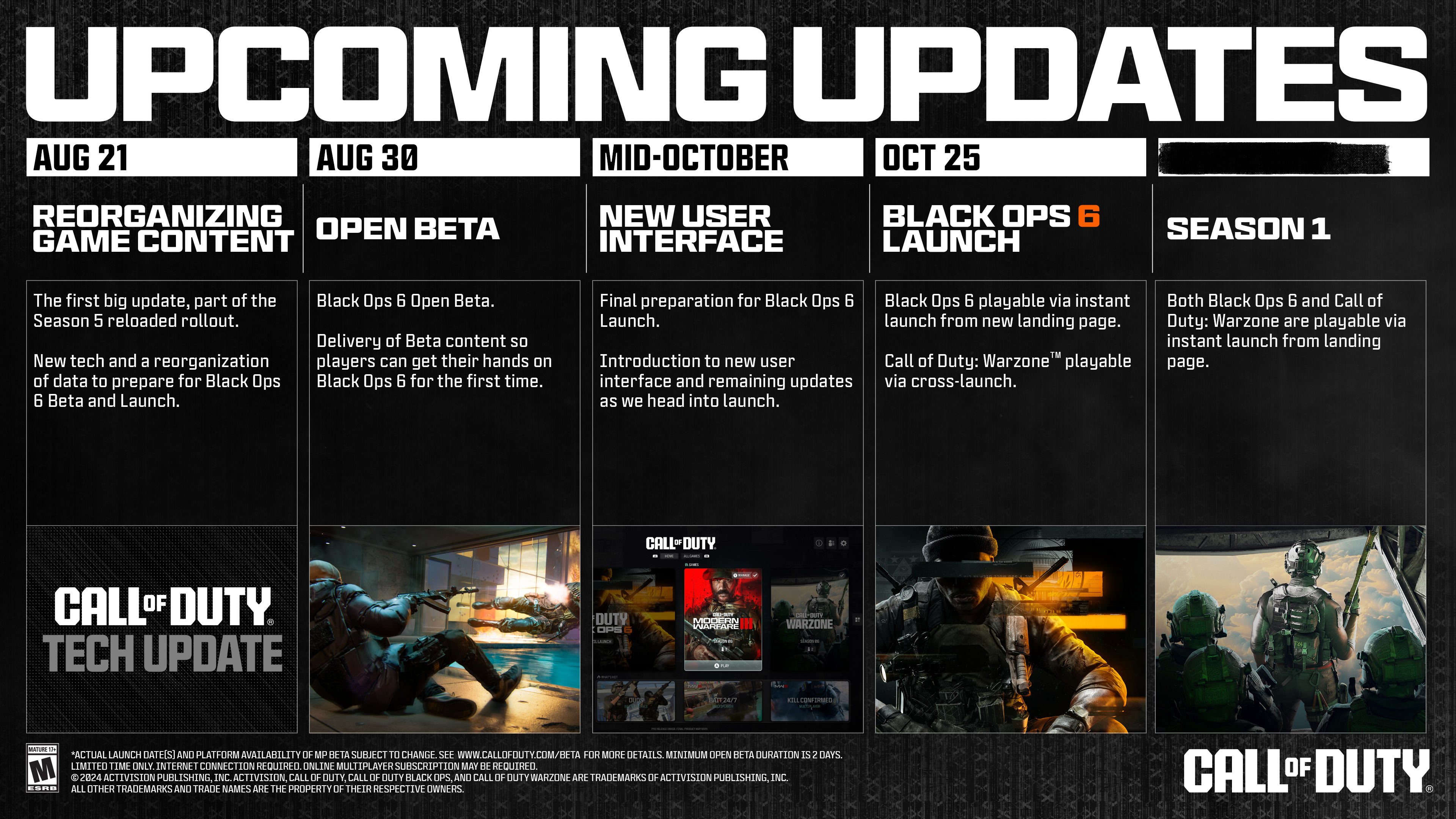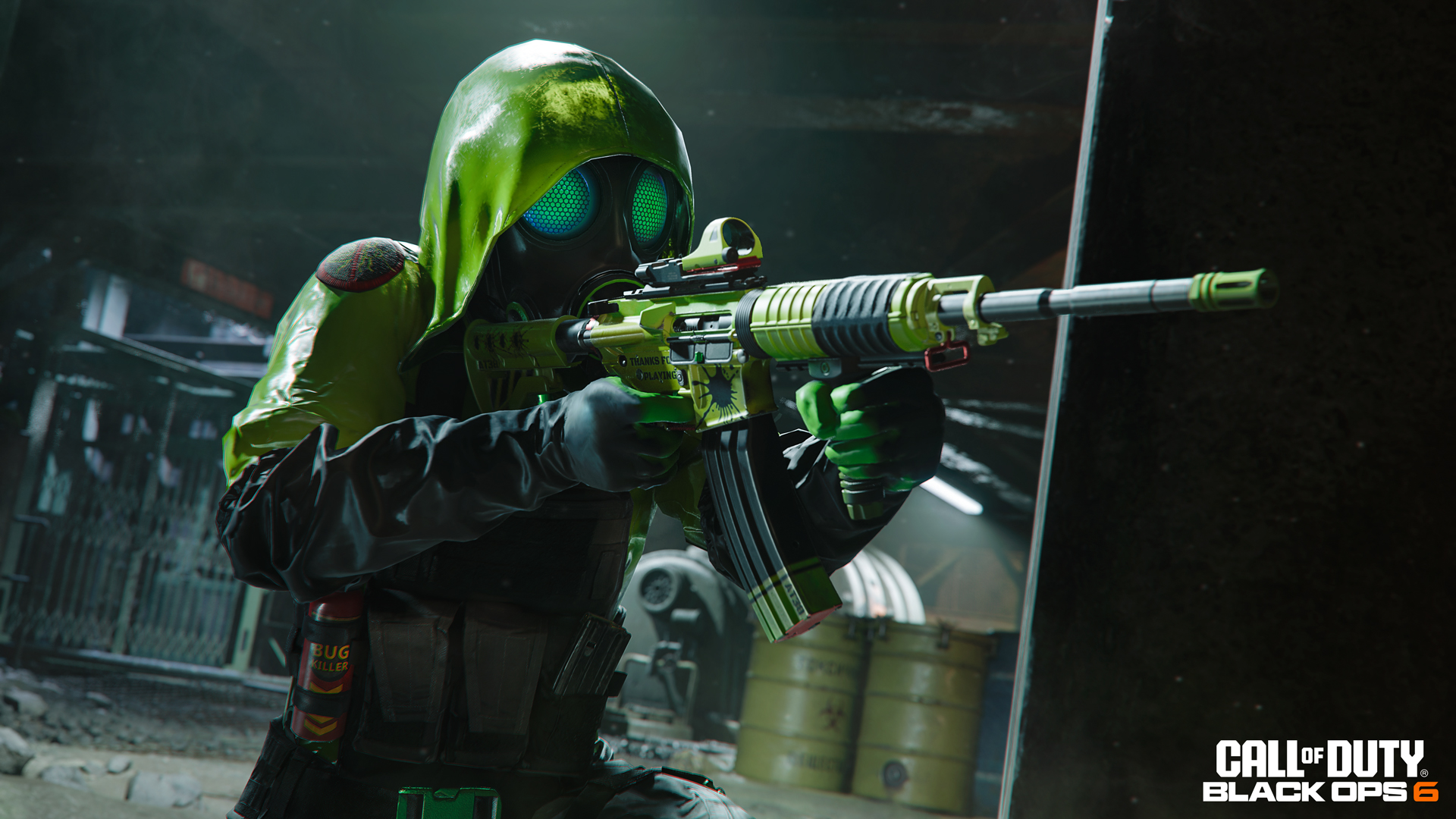Call of Duty: Next is an annual event that brings Call of Duty (COD) content creators and the developers behind the popular shooter series together to reveal the upcoming release’s multiplayer and Warzone content. This year’s COD: Next showcase, however, was the first in the event’s three-year history to bring the press into the fold.
During the event, I had the opportunity to see and play Call of Duty: Black Ops 6 ahead of the open beta and speak with members of the development team from Treyarch Studios in a group interview. Here’s what I learned about Black Ops 6’s development and Call of Duty’s future.
Call of Duty: Black Ops 6 Multiplayer and Omnimovement
Player feedback has played a dominant role in the production of Call of Duty: Black Ops 6. Hot topics in the community, like time to kill and classic prestige, needed to be addressed to win over Call of Duty’s player base but modernized for a changing ecosystem. “We obviously heard the community,” says Yale Miller, Treyarch’s director of production, recounting internal meetings featuring slides of player tweets and feedback.
Treyarch brought back the classic prestige feature from Call of Duty of yesteryear but was challenged to fit the old system into a new world where battle passes and seasonal free content reign supreme. “You can’t just bring back the old system. It’s like, how can you morph it?”
In those early days, it was us asking those hard questions of “What is a Black Ops game to us?”
Matt Scronce, Treyarch Studios
A system like classic prestige worked in previous titles because it gave players a reason to keep playing after the game was done. Battle Passes and seasonal content have largely filled that void in modern iterations of Call of Duty, but the urge to dump your progress for a shiny new token has remained for the nostalgia-inclined. Players are no longer locked to their seasonally allotted level progression with Black Ops 6, and they will now be able to prestige again while reaching for the coveted level 1000 to unlock rewards that will be available on day one—no more waiting for the next season.
Changes to multiplayer’s “time to kill” (TTK) metric have also been the result of player feedback. With Modern Warfare 3 (2023), Sledgehammer Games had boosted the multiplayer TTK to match that of Warzone, slowing down the flow of matches in multiplayer. “Players don’t want it too quick. They don’t want it too high. We feel like we’re in a very great spot, right now with time to kill, where there is still enough time to react if you’re getting shot. But it’s not going to be so high that it feels frustrating,” says Matt Scronce, associate director of design at Treyarch Studios.
Only core gameplay modes were present during the hands-on previews and the beta, so there’s no way to know how the current TTK will affect hardcore modes and weapon balance. The stark difference between the TTK in last year’s multiplayer experience and Black Ops 6’s is palpable, however, and it leaves me with optimism in its current state.
Omnimovement and the skill gap
Faster-paced movement has been the primary marketing focus of Call of Duty: Black Ops 6. The new ”Omnimovement” system required thousands of new animations to pull off and is a dramatic shift in the way players can interact with each other and their surroundings.
Before we get to Omnimovement, we need to talk about how we got here. A movement exploit known as “slide canceling” became a significant gameplay element that took over the community, with players hitting the crouch button to stop a slide, resetting the otherwise limited tactical sprint feature. The exploit effectively gave players infinite tac sprint and, thus, faster movement, but it took significant skill and practice to pull off. This led to the era of so-called “movement kings” who could string together these exploitative movements to break other players’ cameras and become nigh impossible to hit.
The jump from Call of Duty: Warzone Caldera to Warzone 2.0 proved to be a flash point for movement fans when it was discovered slide canceling had been removed. With the release of Modern Warfare 3 in 2023, Sledgehammer Games tried to assuage players by bringing back slide canceling to not just Warzone but also multiplayer. Slide canceling and other movement quirks led to Modern Warfare 3 having a faster-paced multiplayer experience than its predecessors. That seems funny to say, however, after having my hands on Black Ops 6, which is much faster.
The introduction of Omnimovement—that is, the ability to sprint, dive, or otherwise move in any direction—in Black Ops 6 throws what we know about movement in Call of Duty into a spiral. For context, the movement in Modern Warfare 3 is surprisingly slower in comparison to Black Ops 6. This upcoming entry drops the need to slide cancel by giving players the option to put away their firearms in exchange for a melee weapon and unlimited tac sprint. The payoff keeps players feeling like they’re never being forced to slow down, especially when coupled with the new automatic sprint option in the settings, and we see a community waxing poetic about how fluid and fast Black Ops 6 “feels.”
I think the combination of new accessibility features, an “omnimovement training course,” and the limitations of the movement itself will lend to a smaller skill gap and overall improved player experience.
During COD: Next, there was a lot of chatter by fellow attendees about how Omnimovement would “widen the skill gap.” The focus on the skill gap is part of a larger hot-button issue by people who despise Skill Based Matchmaking (SBMM) primarily because they want to have high-scoring games where they demolish lower-skilled players for social media clips. Omnimovement is seemingly perceived as a challenge to get the hang of, and content creators are giddy that they’ll be able to master it while ‘casuals’ will serve as clip fodder.
I tend to be of a different mentality, however. I think the combination of new accessibility features, an “omnimovement training course,” and the limitations of the movement itself will lend to a smaller skill gap and overall improved player experience.
Granted, Black Ops 6 “feels” faster, but it has given players that speed and fluidity in a way that has managed to hamstring the “movement kings” and puts all players on a more even battleground. Everybody can be a movement king, sure. However, the time it takes to recover from jumps, dives, and slides slows things down just enough that there’s been a significant drop in players who engage others with riskier maneuvers. This leads people to be more thoughtful and strategic about utilizing Omnimovement and weighing the risk of being caught during the split-second recovery period. Movement potential is no longer gate-kept by those simply more willing to utilize an exploit.
Movement potential is no longer gate-kept by those simply more willing to utilize an exploit.
Currently, most people have only seen how Omnimovement affects gameplay in multiplayer, though the movement features are also in the campaign and Zombies modes. It’ll also make its way to Warzone this year.
During my hands-on time with Zombies and Warzone’s new resurgence map, Area 99, I had the opportunity to try Omnimovement in both Warzone and Zombies. Omnimovement in Zombies provided some unique opportunities to get out of hairy situations. Still, the skill gap and unfamiliarity with the movement system also lent me some moments where I got myself into even hairier situations. Action diving off a small roof with PHD Flopper to demolish the zombies below always resulted in an unprofessional giggle fit.
Accessibility and omnimovement
It may sound shocking, but Call of Duty is one of the most accessible AAA titles I have ever played as a disabled gamer who struggles with low motor function. For a multiplayer competitive shooter that features cross-play between console and PC, there’s so much at stake with inputs and parity. The last few years of modern Call of Duty titles have leaned heavily into increased accessibility, with Modern Warfare 3 even going so far as to institute “Quick Accessibility Settings” that made sweeping changes based on recommendations for various scenarios.
It may sound shocking, but Call of Duty is one of the most accessible AAA titles I have ever played as a disabled gamer who struggles with low motor function.
I’ve long suffered from fatigue and joint pain as a result of playing games. Over the years, different settings like increased sensitivity and decreased dead zones have helped mitigate the encumbrance. In the past, I had to sort through a variety of controller settings to adjust the ones that would benefit me the most, but after the introduction of Quick Accessibility settings, I could simply choose the “low motor strain” settings.
Black Ops 6 furthers the innovation of accessibility even in the wake of its new movement system by introducing intelligent movement. This is a series of settings within Black Ops 6 that makes certain in-game actions either automatic or otherwise activated with less player input. Automatic tactical sprint, crouch assist, automatic mantle, and other intelligent movement features significantly impact the number of inputs required to play the game. In some cases, I saw that a series of actions decreased from eight button presses down to just two—but all options are adjustable based on player preference. “It’s just like dialing in a car,” Miller said of intelligent movement. “There’s the fastest way to do it, and then there’s the way that’s fastest for you.”
Call of Duty: Black Ops 6 and the fresh start
Call of Duty: Black Ops 6 ties into the Call of Duty HQ engine shared with Modern Warfare 2 (2022) and Modern Warfare 3 (2023), as well as Warzone. The HQ is available on both the Xbox One and PlayStation 4, along with Xbox Series X|S and PlayStation 5 console hardware.
The launch of Warzone 2.0 and the Call of Duty HQ were originally marketed as the start of the franchise’s life on new hardware. Scarcity at the start of the console generation and a large player base that remains on previous consoles ultimately led to the decision to keep Call of Duty on last-gen. When asked about the challenges of continuing development of the blockbuster shooter on last-gen hardware, Miller simply stated, “It’s a horsepower problem.”
For us, gameplay is king.
Yale Miller, Treyarch
“There’s no way, on a last-gen machine, that we can do all the things, especially from a graphical fidelity level. You start getting to a point where you’re looking at visual fidelity and other things. You’re wondering if you want to keep pushing to use CPU or GPU to push on graphics, then you might have to sacrifice gameplay. For us,” Miller elaborated, “Gameplay is king.”
Miller says the team looks at the best way to maximize visuals to be the best they can be on last-gen devices without sacrificing gameplay, but some features just ultimately don’t make the cut. The most notable cut from Black Ops 6 is the anticipated Theater Mode, which had to be removed from last-gen hardware due to the resources required to record and rerun matches. Theater Mode will be present on PC, Xbox Series X|S, and PlayStation 5 versions of Call of Duty: Black Ops 6, however.
Despite having a four-year development time, things were still left on the cutting room floor. “I’m sure there’s a thousand things in a documents folder on my desktop. But I’m so damn happy with where we’re at today,” says Scronce. Both Miller and Scronce are clearly proud of the unique new gameplay mechanics coming to Black Ops 6. “You’ve got the body shield in multiplayer! You’ve got sleeper agent! There’s a couple of things that were on my list.” Scronce added. Miller follows up by adding, “A lot of people said no.”
While Treyarch is the lead development team for Black Ops 6, it truly takes a village to bring up Call of Duty. Every Activision-owned studio has a hand in the development of the franchise. Raven Software partnered with Treyarch to take the lead on the narrative for Black Ops 6’s campaign, and the studio is also the development spearhead for Warzone. “We have an awesome ecosystem with all the studios that are helping out,” says Miller.
When asked if Treyarch would consider collaborating with other Xbox-owned studios, Miller said the current ecosystem was allowing the team to make the game that they wanted. However, occasionally, ideas floated around that could only be viable with additional manpower and support. “There may be situations in the future where those conversations are like, ‘Oh, XYZ studio in the Microsoft family did something.’ But at the moment, that has not come up,” said Miller.
Update requires restart
One major initiative the Call of Duty studios have been toiling away at is the COD HQ launcher. This system, which ties all of the premium Call of Duty titles and Warzone into one unit, has become a massive and unruly behemoth, to the point that there were early rumors Black Ops 6 would consume over 300GB of storage (it won’t.)
An update deployed during the Season 5 Reloaded update for Modern Warfare 3 set out to restructure the launcher ahead of the launch of Black Ops 6 on October 25. Miller dubs this the “Time to fun initiative” and states that Call of Duty is currently not where the team wants it to be with ease of loading into the game from the launcher.
During the beta period, players had to install the COD HQ launcher, start Modern Warfare 3, select Black Ops 6 from the menu, wait for MW3 to close, and then wait for BO6 to launch. Once launched, you were most likely greeted with the infamous Call of Duty “Update requires restart” screen. While the team continues to work on decluttering the launcher experience, Miller concedes they’re not where they want to be just yet.
The COD HQ launcher also brings with it a shared engine for Call of Duty, which required adjustment and transition for Treyarch’s team. “…We weren’t able to just hit the ground running and just like, go—make game, make game, make game.” said Miller. While Sledgehammer Games and Infinity Ward traditionally used a shared engine, Treyarch had their own that had been built upon with each new game. Black Ops 6 was a fresh start for the studio.
“In those early days, it was us asking those hard questions of ‘What is a Black Ops game to us?’ and then building it from the ground up,” said Scronce. Miller follows up by saying that the team had to think about how to get shooting and movement to feel right for Black Ops on the new engine. “We had to redefine those things,” Scronce added.
The benefits of platform parity
Modern Warfare 3 was the official end of Activision’s marketing agreement with PlayStation for Call of Duty. With Black Ops 6 launching fully under the Xbox umbrella, there have been some notable changes to the game’s beta and launch schedule in comparison to previous years. One big change was a more streamlined beta calendar, with all platforms gaining access to the game at the same time. The return to platform parity may have played a role along with overall general excitement for Call of Duty: Black Ops 6 to result in the franchise experiencing its most successful beta ever.
Thank you, Call of Duty Community 🫡The dev team at @Treyarch is going through all the data and feedback to make launch even better. There’s so much more to come on October 25th! #BlackOps6 pic.twitter.com/33mt65cudhSeptember 10, 2024
Treyarch’s team reported the two-weekend beta was #1 in total players, hours played, playtime per player, and most matches played based on data collected during the beta event. While the beta served as an opportunity for players to experience omnimovement and Black Ops 6 hands-on for themselves, it also served as a vital bug testing and feedback experiment for the developers.
“I think the thing that keeps me up is: What are the things that we didn’t even think about? That we missed, right? And that’s why the beta is so important for us,” Miller said. He added that player feedback from the beta can often reveal “gotchas,” missing gameplay functionality, or needed usability features that may be overlooked during development.
Platform parity does not begin and end with the beta. Call of Duty: Black Ops 6 will launch on both the Xbox and PlayStation families of consoles, as well as PC, on October 25, 2024. The game will be available on day one as part of an Xbox and PC Game Pass subscription. There will not be an early access week for campaign preorders this year.


